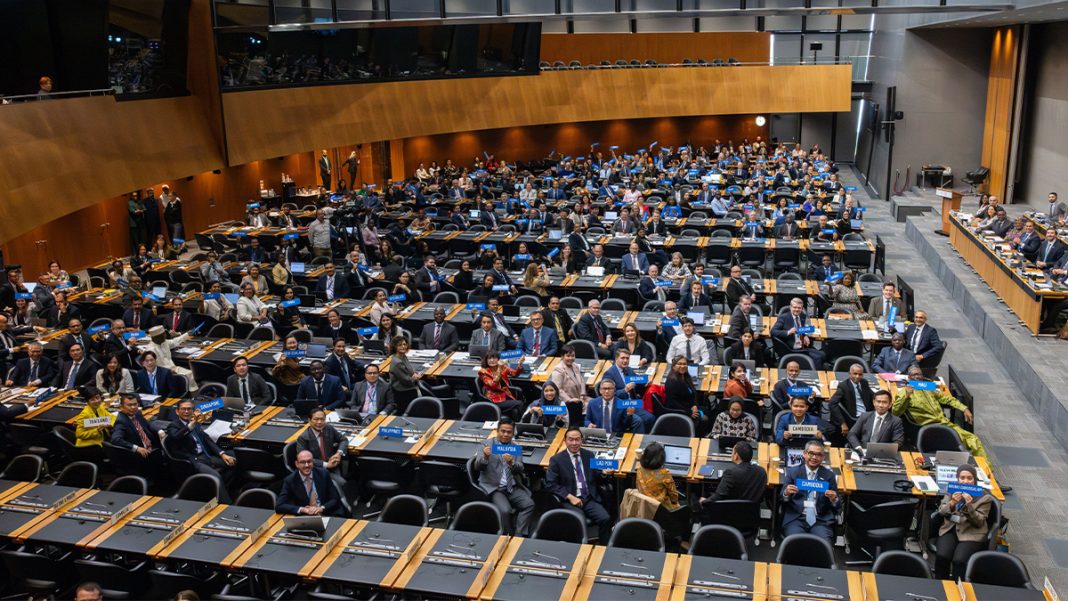By Sharon Atieno
The World Trade Organization (WTO) Agreement on Fisheries Subsidies has entered into force following the submission of instruments of acceptance by more than 111 Member States.
The Agreement, adopted by consensus at the WTO’s 12th Ministerial Conference in June 2022, establishes new, binding, multilateral rules for curbing harmful subsidies, which are a key factor in the widespread depletion of the world’s fish stocks.
Between 1974 and 2021, the overfishing of global fish stocks rose by nearly 25.5 percent. It is estimated that governments spend US$22 billion a year in subsidies to expand fishing capacity, contributing to overcapacity, overfishing and other practices that deplete fish stocks and undermine efforts to achieve sustainable fisheries. Further, the total economic losses caused by illegal, unreported and unregulated (IUU) fishing are estimated to be as high as US$ 50 billion.
Under the Agreement, subsidies contributing to IUU fishing are restricted. The Agreement prohibits subsidies to vessels or operators involved in IUU fishing or fishing-related activities when a relevant Member or regional or international body or organization determines IUU fishing.
Subsidies on overfished stocks are also prohibited except such if they are for rebuilding the relevant stock to a biologically sustainable level, or if other measures are implemented to achieve this purpose.
The Agreement also prohibits subsidies on fishing or fishing-related activities in the unregulated high seas while other provisions require Members to take “special care” and “exercise due restraint” when granting subsidies to vessels not flying that member’s flag, and when granting subsidies to fishing or fishing-related activities regarding stocks of which the status is unknown.
Hailing the Agreement as a “landmark for global trade governance”, Director-General Ngozi Okonjo-Iweala appreciated WTO members for their commitment to protecting the livelihoods of fishing communities around the world. “This Agreement demonstrates how you can put trade in the service of both people and planet,” she said.
Dr. Okonjo-Iweala was speaking during a special General Council meeting on 15 September, where she received the instruments of acceptance of the Agreement from Brazil, Kenya, and Viet Nam and Tonga.
“At a time when the international trading system faces profound challenges, the Agreement on Fisheries Subsidies sends a powerful signal that WTO members can work together in a spirit of cooperation and shared responsibility to deliver solutions to global challenges. The entry into force of this Agreement stands as a reminder that many of the biggest challenges we face are more effectively addressed at the multilateral level. People and nations need a multilateralism that delivers – which is why today is so reassuring,” she said.
Dr. Okonjo-Iweala signed the official depositary notification of the Agreement’s entry into force and handed it to General Council Chair Ambassador Saqer Abdullah Almoqbel of Saudi Arabia, marking the official integration of the Agreement into the WTO legal framework.
“This Agreement is a testament to our shared vision for sustainable global fisheries. Acceptance of the Protocol has demanded not just the engagement of our Ambassadors and delegates here in Geneva. It has also involved genuine political will and careful coordination in capitals. It is thanks to our collective resolve and commitment that we witness its entry into force today,” said Ambassador Almoqbel.
He also announced that Mali and Oman have ratified the Agreement and that they will be depositing their instruments of acceptance soon.
Members hailed the Agreement as a major milestone for the WTO, emphasizing that it confirms their commitment to the multilateral trading system and to a more sustainable planet. They also pledged to start implementing the Agreement, underscoring the key role it will play in restoring fish stocks, protecting the livelihoods of fishing communities and promoting food security.
By establishing rules that prohibit the worst forms of harmful fisheries subsidies, the WTO Agreement on Fisheries Subsidies will help to protect the world’s fish stocks and the livelihoods of hundreds of millions of people who depend on fisheries for food, income and employment.
“I strongly encourage all remaining members to complete their acceptances without delay”, Dr. Okonjo-Iweala said. “One of my key aspirations is to see the Agreement ratified by all members by the 14th Ministerial Conference [scheduled for March 2026], where we will have the opportunity to celebrate this collective achievement together.”
Several WTO members echoed the Director-General’s call for all members to ratify the Agreement and offered their support for capacity building in developing economies to help them implement the Agreement.
Implementation of the Agreement
Ministers have established the WTO Fish Fund to provide developing economies and least-developed countries (LDCs) with technical assistance and capacity-building needed to implement the new obligations and manage their own fisheries more sustainably.
Seventeen members have pledged the equivalent of more than USD 18 million to the WTO Fish Fund.
In June, the Fund launched its first Call for Proposals inviting eligible members that have ratified the Agreement to submit requests for project grants aimed at supporting them implement the Agreement. Applications are due by 9 October. The WTO Fish Fund portal can be found here.
To oversee the implementation of the Agreement, a Committee on Fisheries Subsidies will be established to maintain regular dialogue on members’ fishing practices and subsidies, and to increase transparency regarding governments’ practices.






